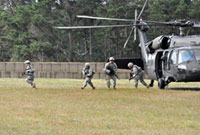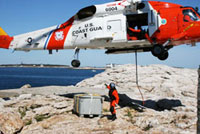JBCC Overview
 abroad. Within its bounds are the members of four major military commands whose missions vary from search and rescue, to intelligence, to training infantry. The four military commands are: the Massachusetts Army National Guard at Camp Edwards; the Massachusetts Air National Guard at Otis Air National Guard Base; the 6th Space Warning Squadron phased array radar site at Cape Cod Air Force Station; and the U.S. Coast Guard at USCG Base Cape Cod. These military commands work to protect the land, sea, and air of the northeastern United States. In addition, many military units and service members who work and train at JBCC are participating in missions around the world.
abroad. Within its bounds are the members of four major military commands whose missions vary from search and rescue, to intelligence, to training infantry. The four military commands are: the Massachusetts Army National Guard at Camp Edwards; the Massachusetts Air National Guard at Otis Air National Guard Base; the 6th Space Warning Squadron phased array radar site at Cape Cod Air Force Station; and the U.S. Coast Guard at USCG Base Cape Cod. These military commands work to protect the land, sea, and air of the northeastern United States. In addition, many military units and service members who work and train at JBCC are participating in missions around the world.
Of JBCC’s 22,000 acres, 15,000 acres comprise the Upper Cape Water Supply Reserve or the northern training area of Camp Edwards. It is the major training area for Army National Guard Soldiers in the Northeast. Soldiers using the Camp Edwards Training Area practice maneuvering, bivouacking (camping), weapons qualification, and collective training exercises. The northern 15,000 acres of JBCC is the largest piece of undeveloped land on Cape Cod and is home to 37 state-listed species living in a variety of habitats throughout the base. Joint Base Cape Cod also sits atop an aquifer that supplies drinking water to Upper Cape Cod. It is known as the Upper Cape Water Supply Reserve and the Camp Edwards Training Area. Historically, the land comprising JBCC was home to the Wampanoag tribe, colonial settlers, a sheep ranch, and a state forest.
In the southern part of the base, or the cantonment area (lower 5,000 acres), are training support and commercial facilities as well as facilities for state and federal entities. The cantonment area also includes Coast Guard family housing, with almost 2,000 residents.
Three programs are at work cleaning up and protecting the environmental resources on and under
 JBCC: The Air Force Civil Engineering Center's Installation Restoration Program (AFCEC IRP) is responsible for the investigation and cleanup of soil and groundwater contamination mainly in the cantonment area of JBCC; The Army National Guard Impact Area Groundwater Study Program manages the investigation and cleanup of groundwater contamination and its sources on and emanating from the northern 15,000 acres; and the Massachusetts Army National Guard Environmental & Readiness Center is dedicated to conducting all training at JBCC in a manner that is protective of the environment now, and in the future.
JBCC: The Air Force Civil Engineering Center's Installation Restoration Program (AFCEC IRP) is responsible for the investigation and cleanup of soil and groundwater contamination mainly in the cantonment area of JBCC; The Army National Guard Impact Area Groundwater Study Program manages the investigation and cleanup of groundwater contamination and its sources on and emanating from the northern 15,000 acres; and the Massachusetts Army National Guard Environmental & Readiness Center is dedicated to conducting all training at JBCC in a manner that is protective of the environment now, and in the future.